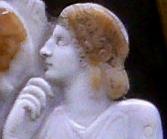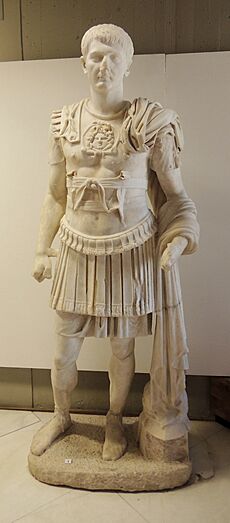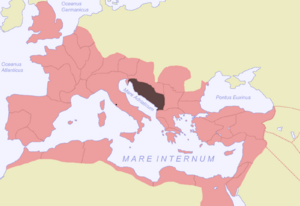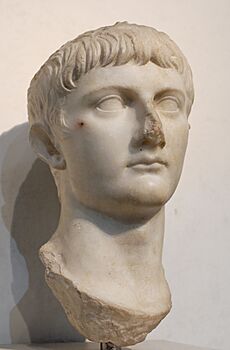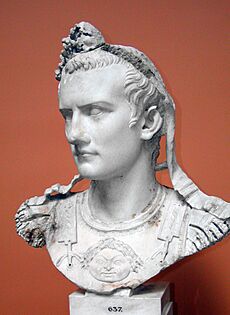Drusus Julius Caesar facts for kids
Quick facts for kids Drusus Julius Caesar |
|
|---|---|
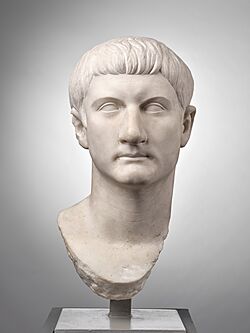
Bust, Musée Saint-Raymond
|
|
| Born | Nero Claudius Drusus 7 October c. 14 BC Rome, Italy |
| Died | 14 September AD 23 (aged approx. 36) |
| Burial | Mausoleum of Augustus |
| Spouse | Livilla |
| Issue |
|
| Dynasty | Julio-Claudian |
| Father | Tiberius |
| Mother | Vipsania Agrippina |
Drusus Julius Caesar (born October 7, 14 BC – died September 14, AD 23) was an important figure in the Roman Empire. He was the son of Emperor Tiberius. After his adoptive brother Germanicus passed away in AD 19, Drusus became the next in line to rule Rome.
He was born in Rome into a powerful Roman family called the gens Claudia. His parents were Tiberius and his first wife, Vipsania Agrippina. At birth, he was named Nero Claudius Drusus after his father's younger brother, Drusus the Elder. In AD 4, he took the name Julius Caesar because his father was adopted into the Julian family by Augustus, the first Roman Emperor. This made him Drusus Julius Caesar.
Drusus started his political career as a quaestor (a Roman official) in AD 10. His career path was very similar to Germanicus's. They both held important government jobs at the same age. Like Emperor Augustus had planned, the two were meant to rule together. Both Drusus and Germanicus were well-liked by the people. Many statues and tributes were made in their honor across Roman Italy. The historian Cassius Dio even called Drusus "Castor," comparing him and Germanicus to the famous twin brothers, Castor and Pollux, from Roman myths.
Drusus died suddenly on September 14, AD 23. Ancient historians like Tacitus and Suetonius wrote that he died during a conflict with Sejanus. Sejanus was a very powerful leader of the Praetorian Guard, the emperor's personal bodyguards. These historians suggested that Drusus was murdered. They claimed his wife, Livilla, who was influenced by Sejanus, helped poison Drusus with a doctor's help. Despite these rumors, Tiberius did not suspect Sejanus at the time. They remained close friends until Sejanus lost his power in AD 31.
Contents
Early Life and Family Connections
Drusus was born around 14 BC in Rome. He was often called "Drusus the Younger" to tell him apart from his uncle, Nero Claudius Drusus. His mother's father was Marcus Vipsanius Agrippa, a close friend of Emperor Augustus.
As a member of the Julio-Claudian dynasty, Drusus was related to all five Roman emperors from this family. His father was the emperor, and his adoptive grandfather, Augustus, founded the Roman Empire. He was also a cousin to Caligula, Claudius, and Nero, who would all become emperors later.
Before Tiberius, Augustus had chosen his grandsons, Gaius and Lucius Caesar, as his heirs. They were meant to rule together but died young. This meant Augustus had to find new heirs. In AD 4, Augustus adopted Tiberius. But there was a condition: Tiberius had to adopt Germanicus. This made Tiberius the next emperor and Germanicus his heir. Augustus wanted Germanicus and Drusus to rule Rome together, just like his earlier plan for Gaius and Lucius.
Later that year, Drusus married his cousin, Livilla. This marriage helped connect him more closely to the Julian family. Tacitus wrote that Livilla was not pretty as a child but grew up to be beautiful. Their daughter, Julia, was born soon after their marriage. In AD 19, they had twin sons, Tiberius Gemellus and Germanicus Gemellus. Sadly, Germanicus Gemellus died as a baby in AD 23. The birth of his sons was celebrated on Roman coins.
Drusus and Germanicus were about the same age and had similar careers. They held all their government jobs at the same age. They both became quaestors at the same time. They were also excused from serving as praetors (another type of Roman official). They held their first and second consulships (highest elected office) at the same age. Both were given special military power (called imperium maius) when they were sent to govern different parts of the empire. Germanicus went to Germania, and Drusus went to Illyricum.
Drusus's Career in Rome
Drusus's first official job was as a quaestor in AD 10. He was interested in politics. So, in AD 13, he became a permanent member of a special committee. This committee, created by Augustus, helped plan the daily business of the Roman Senate.
In August of AD 14, his adoptive grandfather, Augustus, died. To honor him, Drusus read a speech at Augustus's funeral. The next month, on September 17, the Senate met to confirm his father, Tiberius, as the new princeps (emperor). One of Tiberius's first actions was to create the Sodales Augustales. This was a group of priests for the worship of Augustus. Members of the imperial family, including Drusus, joined this group. This was not his first religious role. He had been a pontifex (a priest) since AD 7 or 8. This was an important step towards becoming the highly respected pontifex maximus (chief priest). Since May 14, AD 14, he was also a member of the Fratres Arvales, another religious group.
Drusus did not have much time to mourn Augustus or celebrate his father becoming emperor. Roman legions (armies) in the Rhine region and Illyricum were rebelling. They had not received the extra payments Augustus had promised them. When it seemed Tiberius was not going to respond, they revolted. On September 17 or 18, Drusus was sent to deal with the troops in Illyricum. Germanicus was sent to the Rhine. Drusus did not need special military powers because he was already chosen to be a consul.
Stopping the Revolt in Pannonia
The three legions in Pannonia (modern-day Hungary and parts of Croatia) were under the command of Junius Blaesus. He had given his soldiers a break from duties to mourn Augustus. But discipline broke down, and the soldiers stopped obeying orders. They soon became angry and attacked their officers. Drusus and the Praetorian prefect Sejanus arrived on September 26. They brought two special army units with them.
The soldiers met Drusus when he arrived and let him into their camp. The soldiers were very noisy. But, as Tacitus wrote, Drusus finally read a letter from his father. The letter said Tiberius cared deeply for the brave legions. It promised that once he recovered from his sadness, he would present their demands to the Senate. It also said he had sent his son to grant what could be given right away. The rest would be decided by the Senate.
The soldiers had several demands. They wanted to leave the army after only sixteen years instead of twenty. They also wanted a reward for their service and higher pay. However, talks broke down, and the soldiers started throwing stones at Drusus's group. The next morning, a lunar eclipse before dawn made the soldiers believe their revolt was doomed. Order was restored by sunrise. Drusus was allowed into the camp by Blaesus. He spoke to the troops and praised their calm behavior. He promised to write to his father about their demands.
After gaining control of the soldiers, Drusus's next step was to punish the leaders of the revolt. He sent a search party into the nearby forest to find and deal with those who were not at the assembly. After handling these matters, Drusus returned to Rome.
First Consulship and Governing Illyricum
In AD 15, Drusus served as a consul (one of the two highest elected officials) alongside Gaius Norbanus Flaccus. This year, he hosted gladiatorial games in his and Germanicus's names. He enjoyed these games so much that it bothered other people watching. He was said to perform his duties as consul well. However, he was known for being quick to anger and even got the nickname "Castor" after fighting with a Roman knight. There was also an incident at a theater where Drusus reportedly sided with actors against the Praetorian Guard. This prevented the Guard from punishing unruly actors. Tacitus wrote that the Senate later passed rules to allow officials to punish rowdy spectators. Because of his wild behavior, Tiberius decided to make him governor of Illyricum the next year. This would give Drusus experience in war and help him gain popularity with the troops. It also kept him away from the temptations of city life.
Drusus was sent to Illyricum with special military power. He was governor there from AD 17 to 20. Since Germanicus had left the Rhine region in AD 16, the German tribes that used to fight together against Rome began fighting each other. The two main groups were the Marcomanni led by King Maroboduus and the Cherusci led by Arminius. They fought a battle that had no clear winner, and Maroboduus retreated to his kingdom in Bohemia. Before this, two tribes had switched sides to join Arminius.
Maroboduus realized his situation was bad and asked Rome for help. Two years earlier, the Marcomanni had refused to help Rome against Arminius. So, Tiberius refused to send aid. Instead, Tiberius sent Drusus to gain advantages for Rome at Maroboduus's expense. Tiberius knew the Marcomanni were weak. In the summer of AD 18, Drusus learned from a former prisoner that Maroboduus was weak and it was a good time to attack. So, Drusus led a strong army into the Marcomanni territory and attacked their royal stronghold. Maroboduus fled and had to ask for safety in Rome, which Tiberius granted. Later, another leader lost a battle and was also granted safety in Rome. The Senate decided that Drusus should receive a special celebration (an ovation) for his success. He received this when he returned to Rome on May 28, AD 20.
Becoming the Heir to the Empire
While Drusus was in Illyricum, his adoptive brother Germanicus died in Syria on October 10, AD 19. He died from illness or possibly poison. Germanicus's death made Drusus the new heir to the empire. Germanicus's wife, Agrippina, suspected murder. She believed Tiberius had her husband killed so Drusus could become his heir. However, historian Barbara Levick says this is unlikely. Germanicus's son, Nero, was given an important role the following year, which suggests Tiberius did not want to harm Germanicus's family.
Also on October 10, AD 19, Drusus's wife Livilla gave birth to twin sons, Tiberius Gemellus and Germanicus. He named Germanicus after his adoptive brother. His father, Tiberius, celebrated their birth. He said that never before in Roman history had twins been born to a man of such high rank as Drusus. This event was even shown on the back of Roman coins. Tiberius hoped Drusus would keep the imperial family united. He trusted Drusus with the care of Germanicus's sons, Nero and Drusus.
Drusus returned to Rome in December. He was there on March 20 when Agrippina arrived with Germanicus's ashes. He was also present for the trial of Gnaeus Calpurnius Piso. Piso was found guilty of treason after his death. On December 16, Tiberius gave a speech honoring Germanicus during a Senate meeting. Drusus gave a speech at the next meeting. It was decided that both speeches would be written on bronze. Tiberius's speech was for future generations. Drusus's speech showed his deep respect and loyalty for his adoptive brother.
Several things changed in Tiberius's rule after Germanicus died. Besides losing his adoptive son and heir, Tiberius also lost a friend, Gnaeus Piso. Piso's family had been strong supporters of the emperor since Augustus's time. The loss of Germanicus and Piso's trial greatly hurt Tiberius's popularity. He began to dislike his role as emperor.
Second Consulship
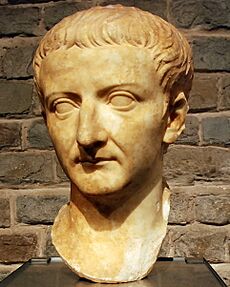
Following the same three-year gap as Germanicus, Drusus was made consul again in AD 21. He held this position with his father, Tiberius. The difficulties of the past two years had made Tiberius withdraw from public life. For Tiberius, Drusus being consul was a welcome sight. Because of his health, Tiberius went to Campania, leaving Drusus to handle the duties of the consulship alone. Tiberius stayed away for about twenty months.
As consul, Drusus took part in many Senate discussions. His first chance to shine in the Senate came during a disagreement between a former official named Gnaeus Domitius Corbulo and Lucius Cornelius Sulla. Cornelius did not give up his seat to Corbulo at a gladiatorial show. This incident led to a debate about the rights of older people versus tradition. Drusus suggested a compromise. In another debate, it was proposed that governors' wives should not be allowed to join their husbands in the provinces. Drusus spoke against this idea, and the proposal was dropped.
Drusus then resolved a problem where people were misusing the protection given by images of the emperor. These images were being used to shield guilty people. Drusus was asked to weigh in on the matter. At the request of many senators, Drusus had a woman named Annia Rufilla arrested and imprisoned for misusing this protection. Later, he was praised for the punishment of two Roman knights. These knights had falsely accused an official of treason. It is likely the Senate and Tiberius were ultimately responsible for the decision, but Drusus still gained popularity.
Meanwhile, there was a rebellion in Gaul led by two Gauls with Roman citizenship. But the rebellion was put down by Gaius Silius without Tiberius or Drusus needing to get involved. After praising the loyalty of the legions in Gaul, Tiberius defended his earlier statement. He had said that neither he nor Drusus should have to "leave the capital" for every small revolt in the empire.
Drusus's consulship was successful. But at the end of the year, he became ill. An equestrian (a Roman knight) named Clutorius Priscus thought Drusus might die. So, he wrote a sad poem about Drusus. Priscus had written a similar poem for Germanicus before and was paid for it. He thought he would be rewarded again. So, he read his poem to an audience, preparing for Drusus's death. Someone who heard him reported the matter to the Senate. The Senate voted that Priscus should be executed. His execution was carried out without first asking the emperor. This led Tiberius to create a new rule. The Senate had to wait 10 days after such decisions before making them public. This allowed Tiberius to learn of their decisions first.
The next year, Tiberius asked the Roman Senate to give Drusus tribunicia potestas (tribunician power). This was a special power that only the emperor and his closest heirs could have. The Senate was very happy and voted to give Drusus statues, shrines, temples, an arch, and other honors. So, in the spring of AD 22, Drusus received this power. Only two men before him had been given this honor by Augustus: Marcus Agrippa and Tiberius himself. Tiberius had never given this power to Germanicus. This meant Drusus now shared the symbol of supreme power with his father.
Challenges and Decline
While Drusus was officially the heir to Tiberius, in reality, the Praetorian prefect Sejanus was the second most powerful man in the empire. As early as AD 20, Sejanus tried to strengthen his ties to the imperial family. He planned for his daughter to marry the son of Claudius. The girl was only 4 years old, but the marriage was stopped when the boy died accidentally a few days later. Still, Sejanus's desire for more power was clear.
By AD 23, Sejanus had a lot of influence over the emperor. Tiberius even called him Socius Laborum ("my partner in my hard work"). Sejanus's influence allowed him to become a praetor, a position rarely given to people of his social class. His supporters in the Senate were given better jobs, and statues were put up in his honor.
By this time, the dislike between Drusus and Sejanus had grown very strong. Drusus had even hit Sejanus and openly complained that "a stranger was invited to help govern while the emperor's son was alive." According to historian Levick, there is no evidence of bad relations between them before this point. However, it might have started with a clash between actors and the Praetorian Guard in AD 15. More concerning for Drusus was that in AD 20, his father spoke of Sejanus to the Senate as his partner in power. For Drusus, who was the heir to that very position, this was a real worry. At the time, Tiberius was in his sixties, so Drusus could realistically become emperor soon. Tacitus wrote that Sejanus began secretly plotting against Drusus to secure his own position.
Sejanus convinced Drusus's wife Livilla that he loved her. He even divorced his own wife. They involved Livilla's doctor, whom they met secretly. With Livilla's help, Drusus was poisoned and died. His death appeared to be from natural causes. Cassius Dio wrote that Sejanus's actions were revealed in a letter from his former wife after Sejanus's death in AD 31.
After Drusus's Death
Unlike Germanicus, Drusus was given a full funeral. His body was buried in the Mausoleum of Augustus, where other members of the imperial family were laid to rest. Like Germanicus, rumors of poison spread, with Sejanus being named as the murderer. However, some modern historians believe Drusus may have simply died from illness.
His death deeply saddened Tiberius. It also created a challenge for the future of the Roman Empire. Tiberius still trusted Sejanus and did not suspect him. Since Drusus's son was too young to rule, Tiberius adopted his grandsons by Germanicus, Nero and Drusus. He recommended them to the Senate as future leaders. Nero was given the job of quaestor five years early. He also married Julia Livia, Drusus's daughter. This was done to connect the families of both possible successors. However, neither Nero nor Drusus would live to become emperor after Tiberius.
By AD 26, the emperor Tiberius had completely withdrawn from politics. He moved to Capri, leaving the empire's management to Sejanus. Sejanus then began to remove other members of the imperial family. In AD 28 or 29, Nero was sent away to an island as an enemy of the state. Germanicus's son Drusus was imprisoned in a dungeon under the Imperial palace in Rome. He died there from starvation not long after. Nero died in exile in AD 33.
Sejanus remained powerful until his sudden downfall and quick execution in October AD 31. The exact reasons for his fall are still not fully clear.
The deaths of Germanicus's older sons meant his third son, Gaius Caesar (known as Caligula), became the next in line. He became emperor when Tiberius died in AD 37. Drusus's son, Tiberius Gemellus, was called to Capri by Tiberius. There, he and Caligula were named joint heirs. When Caligula became emperor, he adopted Gemellus. But Caligula soon had Gemellus killed, believing he was plotting against him.
Images for kids
-
Bust of Drusus in Prado (Madrid).
See also
- Britannicus – son of Roman emperor Claudius who died before his father
- Caracalla – murdered and replaced by Praetorian prefect Macrinus in AD 217
- Romanos II – emperor of Byzantium who suddenly died at the age of 21
 | Jewel Prestage |
 | Ella Baker |
 | Fannie Lou Hamer |


